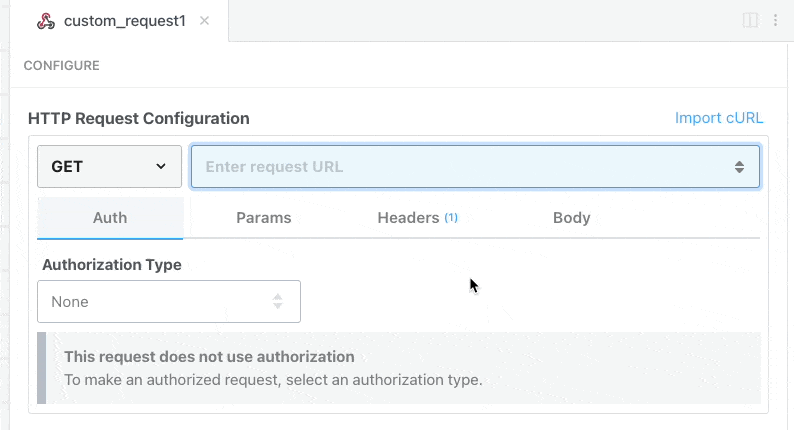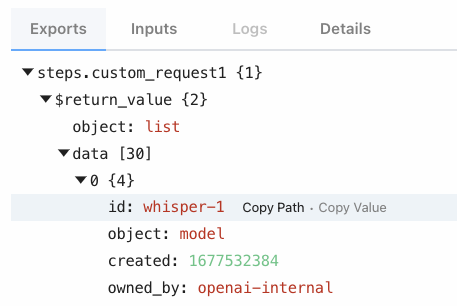import { PRICE_TYPE_OPTIONS } from "../../common/constants.mjs";
import { throwError } from "../../common/utils.mjs";
import limoexpress from "../../limoexpress.app.mjs";
export default {
key: "limoexpress-create-booking",
name: "Create Limo Booking",
description: "Creates a new limo booking with specified details. [See the documentation](https://api.limoexpress.me/api/docs/v1#/Bookings/createBooking)",
version: "0.0.2",
annotations: {
destructiveHint: false,
openWorldHint: true,
readOnlyHint: false,
},
type: "action",
props: {
limoexpress,
bookingTypeId: {
propDefinition: [
limoexpress,
"bookingTypeId",
],
},
bookingStatusId: {
propDefinition: [
limoexpress,
"bookingStatusId",
],
optional: true,
},
fromLocationName: {
type: "string",
label: "From Location Name",
description: "The pickup location name.",
},
fromLocationFullAddress: {
type: "string",
label: "From Location Full Address",
description: "The pickup location full address.",
},
fromLocationLatitude: {
type: "string",
label: "From Location Latitude",
description: "The pickup location latitude.",
optional: true,
},
fromLocationLongitude: {
type: "string",
label: "From Location Longitude",
description: "The pickup location longitude.",
optional: true,
},
toLocationName: {
type: "string",
label: "To Location Name",
description: "The dropoff location name.",
},
toLocationFullAddress: {
type: "string",
label: "To Location Full Address",
description: "The dropoff location full address.",
},
toLocationLatitude: {
type: "string",
label: "To Location Latitude",
description: "The dropoff location latitude.",
optional: true,
},
toLocationLongitude: {
type: "string",
label: "To Location Longitude",
description: "The dropoff location longitude.",
optional: true,
},
pickupTime: {
type: "string",
label: "Pickup Time",
description: "The time scheduled for pickup. **Format: YYYY-MM-DD HH:MM:SS**",
},
expectedDropOffTime: {
type: "string",
label: "Expected Drop Off Time",
description: "The expected drop off time. **Format: YYYY-MM-DD HH:MM:SS**",
optional: true,
},
expectedComebackTime: {
type: "string",
label: "Expected Comeback Time",
description: "The expected comeback time. **Format: YYYY-MM-DD HH:MM:SS**",
optional: true,
},
vehicleClassId: {
propDefinition: [
limoexpress,
"vehicleClassId",
],
withLabel: true,
optional: true,
},
vehicleId: {
propDefinition: [
limoexpress,
"vehicleId",
({ vehicleClassId }) => ({
vehicleClassId: vehicleClassId.label,
}),
],
optional: true,
},
price: {
type: "string",
label: "Price",
description: "The price of the booking.",
optional: true,
},
priceType: {
type: "string",
label: "Price Type",
description: "The type of price for the booking.",
options: PRICE_TYPE_OPTIONS,
optional: true,
},
commissionAmount: {
type: "string",
label: "Commission Amount",
description: "The commission amount for the booking.",
optional: true,
},
currencyId: {
propDefinition: [
limoexpress,
"currencyId",
],
optional: true,
},
vatPercentage: {
type: "string",
label: "VAT Percentage",
description: "The VAT percentage for the booking.",
optional: true,
},
paymentMethodId: {
propDefinition: [
limoexpress,
"paymentMethodId",
],
optional: true,
},
distance: {
type: "integer",
label: "Distance",
description: "Number of kilometers/miles that booking will take.",
optional: true,
},
duration: {
type: "string",
label: "Duration",
description: "Number of hours and minutes that booking will take. **Format: HH:MM**",
optional: true,
},
paid: {
type: "boolean",
label: "Paid",
description: "Flag that says is the booking paid or not.",
optional: true,
},
confirmed: {
type: "boolean",
label: "Confirmed",
description: "Flag that says is the booking confirmed or not.",
optional: true,
},
roundTrip: {
type: "boolean",
label: "Round Trip",
description: "Flag that says is the booking a round trip or not.",
optional: true,
},
note: {
type: "string",
label: "Note",
description: "Note for the dispatcher.",
optional: true,
},
noteForDriver: {
type: "string",
label: "Note for Driver",
description: "Note for the driver.",
optional: true,
},
flightNumber: {
type: "string",
label: "Flight Number",
description: "Flight number for the booking.",
optional: true,
},
numOfWaitingHours: {
type: "integer",
label: "Number of Waiting Hours",
description: "Number of waiting hours.",
optional: true,
},
clientId: {
propDefinition: [
limoexpress,
"clientId",
],
optional: true,
},
waitingBoardText: {
type: "string",
label: "Waiting Board Text",
description: "Text that will be places on the waiting board.",
optional: true,
},
babySeatCount: {
type: "integer",
label: "Baby Seat Count",
description: "Number of baby seats that will be used for the booking.",
optional: true,
},
suitcaseCount: {
type: "integer",
label: "Suitcase Count",
description: "Number of suitcases that will be used for the booking.",
optional: true,
},
checkpoints: {
type: "string[]",
label: "Checkpoints",
description: "List of objects of checkpoints location and time. **Format: [{\"location\": { \"name\": string, \"full_address\": string, \"coordinates\": { \"lat\": number, \"lng\": number } }, \"time\": \"01:14\"}]**",
optional: true,
},
passengers: {
type: "string[]",
label: "Passengers",
description: "List of objects of passengers. **Format: [{\"first_name\": string, \"last_name\": string, \"phone\": string, \"email\": string, \"nationality\": string, \"passport\": string, \"country_id\": UUID }]",
optional: true,
},
},
async run({ $ }) {
try {
const response = await this.limoexpress.createBooking({
$,
data: {
booking_type_id: this.bookingTypeId,
booking_status_id: this.bookingStatusId,
from_location: {
name: this.fromLocationName,
full_address: this.fromLocationFullAddress,
coordinates: {
lat: this.fromLocationLatitude,
lng: this.fromLocationLongitude,
},
},
to_location: {
name: this.toLocationName,
full_address: this.toLocationFullAddress,
coordinates: {
lat: this.toLocationLatitude,
lng: this.toLocationLongitude,
},
},
pickup_time: this.pickupTime,
expected_drop_off_time: this.expectedDropOffTime,
expected_comeback_time: this.expectedComebackTime,
vehicle_class_id: this.vehicleClassId.value,
vehicle_id: this.vehicleId,
price: this.price && parseFloat(this.price),
price_type: this.priceType,
commission_amount: this.commissionAmount && parseFloat(this.commissionAmount),
currency_id: this.currencyId,
vat_percentage: this.vatPercentage && parseFloat(this.vatPercentage),
payment_method_id: this.paymentMethodId,
distance: this.distance,
duration: this.duration,
paid: this.paid,
confirmed: this.confirmed,
round_trip: this.roundTrip,
note: this.note,
note_for_driver: this.noteForDriver,
flight_number: this.flightNumber,
num_of_waiting_hours: this.numOfWaitingHours,
client_id: this.clientId,
waiting_board_text: this.waitingBoardText,
baby_seat_count: this.babySeatCount,
suitcase_count: this.suitcaseCount,
checkpoints: this.checkpoints,
passengers: this.passengers,
},
});
$.export("$summary", `Successfully created booking with ID ${response.data.id}`);
return response;
} catch ({ response }) {
throwError(response);
}
},
};
 Chase Roberts@chsrbrts@benedictevans If you haven’t used @pipedream yet, then you haven’t lived.
Chase Roberts@chsrbrts@benedictevans If you haven’t used @pipedream yet, then you haven’t lived. ✨Ellie Day✨@heyelliedayEvaluation update: @pipedream has quite literally been a dream to work with! I’m excited to leverage this tool for all the various workflows I need to write. I’m currently at 11k invocations a day from the initial workflows I’ve written in the past couple weeks.
✨Ellie Day✨@heyelliedayEvaluation update: @pipedream has quite literally been a dream to work with! I’m excited to leverage this tool for all the various workflows I need to write. I’m currently at 11k invocations a day from the initial workflows I’ve written in the past couple weeks. Michael Braedley@MBraedleyUpdate: I got it working properly, and it's working so well that I'm dropping IFTTT. @pipedream can do everything that IFTTT basic can, and most (if not all things) IFTTT pro can for free or at a reasonable price if you need it. I am recommending it for basically any power user.
Michael Braedley@MBraedleyUpdate: I got it working properly, and it's working so well that I'm dropping IFTTT. @pipedream can do everything that IFTTT basic can, and most (if not all things) IFTTT pro can for free or at a reasonable price if you need it. I am recommending it for basically any power user. Thomas Cutting@mrthomascuttingWant quick+dirty integrations for a serverless workflow - @pipedream is my new go-to 😃
Thomas Cutting@mrthomascuttingWant quick+dirty integrations for a serverless workflow - @pipedream is my new go-to 😃 Matthew Roberts@mattdotrobertsday 013 - finally hit node js. This is the secret sauce of taking #nocode projects that one step further. Pumped about getting deeper into @pipedream now
Matthew Roberts@mattdotrobertsday 013 - finally hit node js. This is the secret sauce of taking #nocode projects that one step further. Pumped about getting deeper into @pipedream now Kenneth Auchenberg 💭@auchenbergYahoo Pipes is back! Kinda 😍 @pipedream
Kenneth Auchenberg 💭@auchenbergYahoo Pipes is back! Kinda 😍 @pipedream Raymond Camden 🥑@raymondcamdenAwesome video by the @pipedream folks showing real time twitter sentiment analysis integrated with Google Sheets. This is where Pipedream *really* shines, connecting systems together in easy workflows.
Raymond Camden 🥑@raymondcamdenAwesome video by the @pipedream folks showing real time twitter sentiment analysis integrated with Google Sheets. This is where Pipedream *really* shines, connecting systems together in easy workflows. Nacho Caballero@nachocaballeroI couldn't recommend @pipedream more. It's an amazing service to integrate different APIs. Much more powerful than Zapier and more user-friendly than AWS Lambda. I'm very proud to wear this t-shirt #NoCode
Nacho Caballero@nachocaballeroI couldn't recommend @pipedream more. It's an amazing service to integrate different APIs. Much more powerful than Zapier and more user-friendly than AWS Lambda. I'm very proud to wear this t-shirt #NoCode Jason Snow@jyksnwDeveloped a working prototype environmental sensor IoT solution with @particle Photon, @pipedream, and @MongoDB with full graphing and alerting in less than a day! All amazing technology, will def. be exploring these more.
Jason Snow@jyksnwDeveloped a working prototype environmental sensor IoT solution with @particle Photon, @pipedream, and @MongoDB with full graphing and alerting in less than a day! All amazing technology, will def. be exploring these more. Steven Terrana@steven_terrana@burgwyn you've inspired me to finally set up my own blog. I'll make sure my first blog post explains the tech behind the setup. think @obsdmd + @GatsbyJS + @pipedream.
Steven Terrana@steven_terrana@burgwyn you've inspired me to finally set up my own blog. I'll make sure my first blog post explains the tech behind the setup. think @obsdmd + @GatsbyJS + @pipedream. 🚄 James Augeri, PhD@DotDotJamesWant to low-code your back end, need more horsepower than @Bubble / @KnackHQ, or just miss Yahoo! Pipes? Check out @PipeDream
🚄 James Augeri, PhD@DotDotJamesWant to low-code your back end, need more horsepower than @Bubble / @KnackHQ, or just miss Yahoo! Pipes? Check out @PipeDream Sébastien Chopin@AtinuxGitHub issues should be like @linear_app for maintainers. Looking forward more integrations with GH actions or tools like @pipedream 👀
Sébastien Chopin@AtinuxGitHub issues should be like @linear_app for maintainers. Looking forward more integrations with GH actions or tools like @pipedream 👀 Raul@raul_predescuIf you're a dev and not using @pipedream, you're missing out. Been using it for months, daily. FREE for devs. Plenty of integrations and good limits. Absolutely love it.
Raul@raul_predescuIf you're a dev and not using @pipedream, you're missing out. Been using it for months, daily. FREE for devs. Plenty of integrations and good limits. Absolutely love it. Bruno Skvorc@bitfallsSo @pipedream is pretty amazing. In 3 minutes I just made a flow which adds @rickastley's Never Gonna Give You Up to my @spotify playlist whenever a new pull request arrives in an old repo of mine.
Bruno Skvorc@bitfallsSo @pipedream is pretty amazing. In 3 minutes I just made a flow which adds @rickastley's Never Gonna Give You Up to my @spotify playlist whenever a new pull request arrives in an old repo of mine. Zach Lanich@ZachLanichUm, wow 🤯 @pipedream
Zach Lanich@ZachLanichUm, wow 🤯 @pipedream Steven Bell@bellontechI just used @pipedream to build a Shopify App. Wow, they make small backed tasks easy.
Steven Bell@bellontechI just used @pipedream to build a Shopify App. Wow, they make small backed tasks easy. Jay Hack 🎩🇺🇸@_jayhack_Very impressed with this bad boi - it reminds me of a @PalantirTech internal tool, but geared towards integrations instead of data analysis and far more customizable. Great expectations here 🚀🤩
Jay Hack 🎩🇺🇸@_jayhack_Very impressed with this bad boi - it reminds me of a @PalantirTech internal tool, but geared towards integrations instead of data analysis and far more customizable. Great expectations here 🚀🤩 Tree Sturgeon 🔥🚴♂️🌳@philsturgeonFor context this is day 2 of a really challenging and stupid migration from Notion to @airtable with disparate/missing data. It's going better than expected and thanks to @pipedream I don't have to bother the iOS dev to add W3W.
Tree Sturgeon 🔥🚴♂️🌳@philsturgeonFor context this is day 2 of a really challenging and stupid migration from Notion to @airtable with disparate/missing data. It's going better than expected and thanks to @pipedream I don't have to bother the iOS dev to add W3W.




